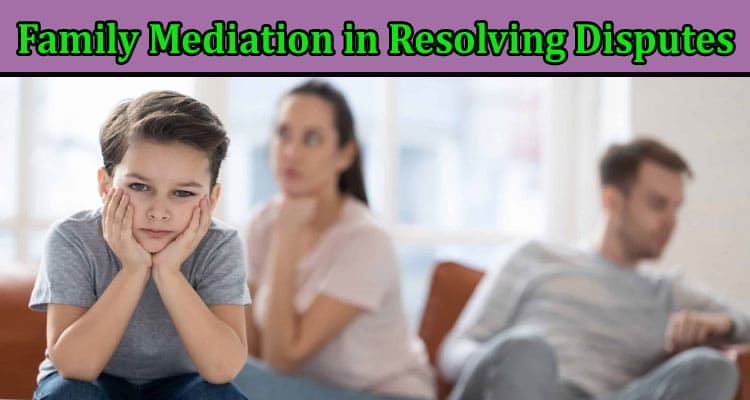Family disputes have their fair share of emotional rollercoasters and common legal claims. It is imperative to have suitable resolution strategies for such disputes. A shining star, however, is family mediation, which provides a legal framework for understanding, collaboration, and peaceful negotiated settlements. This article is an all-encompassing guide on mediation and its application in families as an alternative means of solving disputes. If you’re dealing with family disputes, consider family mediation options.
Harnessing the Potential in Family Mediation
Family mediation is more than just a method for resolving disputes; it’s a waypoint to peaceful living and togetherness. Mediation adopts a constructive style of conducting affairs, unlike the adversarial nature of traditional legal battles, which further aggravates tensions. The model involves encouraging proper communication, understanding, and compromise between families.
Analyzing the Who, Why, Where, How, When, and What
Here’s how families can embrace mediation in resolving disputes:
1. What Parties Can Use Family Mediation to Resolve Disputes?
Mediation is useful in resolving conflicts within the family between spouses, parents, children, or even extended families.
It is very helpful to those looking for a different resolution means other than the contested and slow court procedure.
2. Why Choose Family Mediation?
Preserving relationships: The purpose of mediation is to preserve or nurture family relationships and minimize the consequences of conflict.
Cost-effectiveness: Mediation tends to be less expensive than courts, thus making it affordable to many individuals.
Efficiency: Usually, mediation takes less time to solve issues as compared to court hearings.
Confidentiality: In contrast to public court hearings, mediation provides a confidential environment.
Empowerment: Empowerment makes possible resolutions through a majority vote made by the participants instead of a judge.
3. Where Do Family Mediation Sessions Usually Occur?
Mediation sessions take place in a neutral environment where everyone feels relaxed during their proceedings, allowing for a free expression of opinions.
4. How Does Family Mediation Work?
In the disputed issue, a neutral and trained mediator leads the discussion. Mediators listen to the participants’ fears and help the parties to agree on amicable resolutions. Unlike the arbitrator, who makes decisions in most cases, a mediator does not impose settlements on the parties.
Note that there might be legal advisors around to guide the process.
5. When to Consider Family Mediation
The parties can solve issues such as divorce, child custody disputes, inheritance disagreements, and elder care by mediation.
6. What Are the Advantages of Family Mediation?
Listed below are some of the advantages of family mediation:
Preservation of Relationships
One of the outstanding advantages of family mediation is the ability to save or recreate relationships. Mediation does not create scars like court trials. It allows people to have opportunities to talk out issues freely at home among family members. The process enables participants to air out their concerns, search for a peaceful solution, and ensure the retention of cordial relations.
Cost-Effectiveness
Legal proceedings might end up being expensive. The mediation option is cheaper because it costs less than the legal fees and may require fewer sessions. In other words, the mediation process is more affordable, allowing many more people to be able to seek a fair and peaceful resolution.
Efficiency
Time is crucial, even when it comes to family disputes. The mediation approach is often faster and cheaper since it aims at the settlement of disputes rather quickly. The fast resolution speed shortens the emotional strain as well as the uncertainty that accompanies long court cases.
Privacy and Confidentiality
Mediation offers a private forum where the private affairs of the family remain hidden from the eyes of the general public. Participants can freely raise their concerns without fear that they could become the subject of open discussions in public.
Empowerment
Participation helps to increase the empowerment of people through family mediation. Rather than enforcement through some order by a judge, relatives collaboratively design remedies that work best for the dispute.
The Legal Framework of Family Mediation
Indeed, family mediation is carried out under legal limits in most states. Courts recognize and accept this method as a legal mode of settling conflicts. The parties involved in mediated agreements are bound by law hence, they have to comply with all the stipulated conditions. Family mediation is among the best dispute resolution methods because of this legal backstop.
Life Without Family Mediation: A Bleak Perspective
We should consider what is at stake by not mediating – a series of long-drawn-out litigation processes. The disagreements become warfare, eroding emotional stability, money, and valuable time. Litigations break relationships and destroy families. Many times, it is on the back burner because the well-being of children and other vulnerable family members tends to be in the background in case the parties choose the courtroom environment.
Choosing Harmony Over Hostility
In the realm of family conflicts, the choice between harmony and hostility is profound. Family mediation emerges as a beacon of hope, offering a legal perspective that champions understanding, cooperation, and peaceful settlements. It provides a platform where family members can address their concerns, find common ground, and preserve precious relationships. With its numerous benefits, including cost-effectiveness, efficiency, confidentiality, and empowerment, family mediation stands as a testament to the power of resolution through understanding, ultimately promoting the well-being of families and fostering a brighter future.

